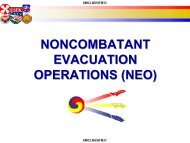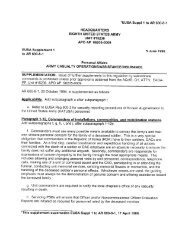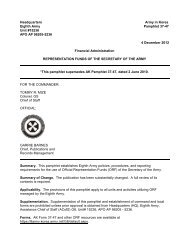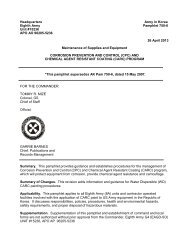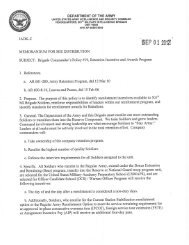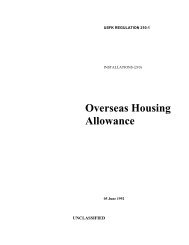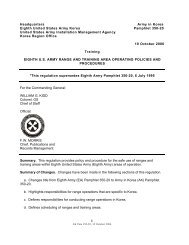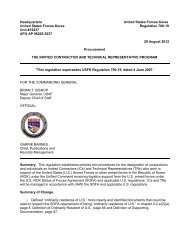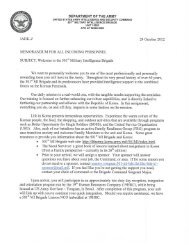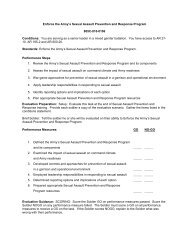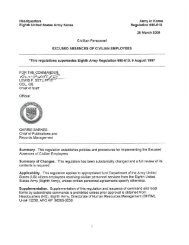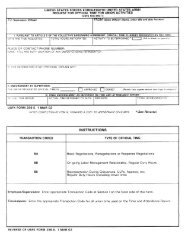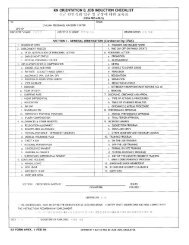USFK Reg 4-1, Korea Distribution - Eighth Army
USFK Reg 4-1, Korea Distribution - Eighth Army
USFK Reg 4-1, Korea Distribution - Eighth Army
You also want an ePaper? Increase the reach of your titles
YUMPU automatically turns print PDFs into web optimized ePapers that Google loves.
a. Hub shipment time standards. Time standards apply to the following organizations:<br />
(1) <strong>USFK</strong> is responsible to meet the overall 72 hour time standard that begins when cargo<br />
is shipped from the sea or air node and ends when the item is received into the unit supply<br />
management system. Within <strong>USFK</strong> staff, it is the responsibility of the <strong>USFK</strong> <strong>Distribution</strong> Process<br />
Owner to ensure the 72 hour time standard is met by the <strong>USFK</strong> <strong>Distribution</strong> System.<br />
(2) The air or sea node unit is responsible to meet the initial 2-hour receiving time standard<br />
as cargo arrives to air and sea nodes. This time is comprised of both unloading time and electronic<br />
processing time. Although this initial 2-hour receiving time standard does not count against<br />
<strong>USFK</strong>’s 72 hour time standard to complete intra-theater distribution, this time standard is<br />
established for intra-theater sea and air nodes to ensure inbound cargo is not unnecessarily<br />
delayed en route to units. In the case of air nodes, this 2 hour receiving time begins when an<br />
arriving aircraft touches down, lands, and is wheels down on-Pen. In the case of the sea node, this<br />
two hour receiving time begins when an arriving item arrives at Pier dock location. This receiving<br />
time is complete when the item is received into the port’s automated cargo reception system or<br />
when in-transit visibility information is sent out to the <strong>USFK</strong> Joint <strong>Distribution</strong> Management Agent<br />
that allows external in-transit visibility of the cargo shipments. The <strong>USFK</strong> distribution goal is that<br />
this system is automated to require no more than 5 minutes to complete. This time is not to exceed<br />
2 hours without exceeding the <strong>USFK</strong> <strong>Distribution</strong> standard.<br />
(3) The air or sea node unit is responsible to meet the initial 15-hour shipping time standard<br />
as cargo arrives to air and sea nodes. Although this initial 15-hour shipping time standard does<br />
not count against <strong>USFK</strong>’s 72 hour time standard to complete intra-theater distribution, this time<br />
standard is established for intra-theater sea and air nodes to ensure inbound cargo is not<br />
unnecessarily delayed en route to units. In the case of both sea and air nodes, this 15-hour<br />
shipping time begins when the arriving cargo has completed its receiving and all automated<br />
processing and information sharing concerning that shipment’s arrival at the sea or air node is<br />
complete. This shipping time is complete when the item has onward transportation scheduled for<br />
the cargo to continue on to the <strong>USFK</strong> <strong>Distribution</strong> hub. In order to complete this activity, the sea<br />
and air nodes will need the cooperation of the 25 th Transportation Battalion to determine the<br />
scheduled onward movement. The <strong>USFK</strong> distribution goal is that advanced warning of inbound<br />
shipments allows this activity to be complete prior to the end of the receiving activity, meaning that<br />
there is no time required for this event to occur. This shipping time is not to exceed 15 hours<br />
without exceeding the <strong>USFK</strong> <strong>Distribution</strong> standard.<br />
(4) The 25 th Transportation Battalion is responsible to meet the initial 10-hour<br />
transportation time standard following cargo arrival to air and sea nodes. This initial 10-hour<br />
transportation time standard does count against <strong>USFK</strong>’s 72 hour time standard to complete intratheater<br />
distribution. This time standard is established to ensure inbound cargo is not unnecessarily<br />
delayed en route to units. This 10-hour shipping time begins when the air or sea node unit begins<br />
to load the cargo onto the transportation asset. This transportation time is complete on arrival at<br />
the <strong>USFK</strong> <strong>Distribution</strong> hub dock where the RIFD interrogator can read the arriving RFID tags. In<br />
order to complete this activity, the 25 th Transportation Battalion, will need the cooperation of the<br />
sea and air node units to initiate and complete the loading of the cargo. The 25 th Transportation<br />
Battalion will also need the cooperation of which ever transportation company provides the<br />
transportation asset to have the asset spotted at the sea or air port at the scheduled spot time.<br />
The <strong>USFK</strong> distribution goal is that separate time standards that fall within the overall 10-hour time<br />
standard are established, and met for each segment of the <strong>USFK</strong> <strong>Distribution</strong> system. In the worst<br />
case, this transportation time is not to exceed 10 hours without exceeding the <strong>USFK</strong> <strong>Distribution</strong><br />
standard.<br />
19<br />
<strong>USFK</strong> <strong>Reg</strong> 4-1, 9 February 2009



